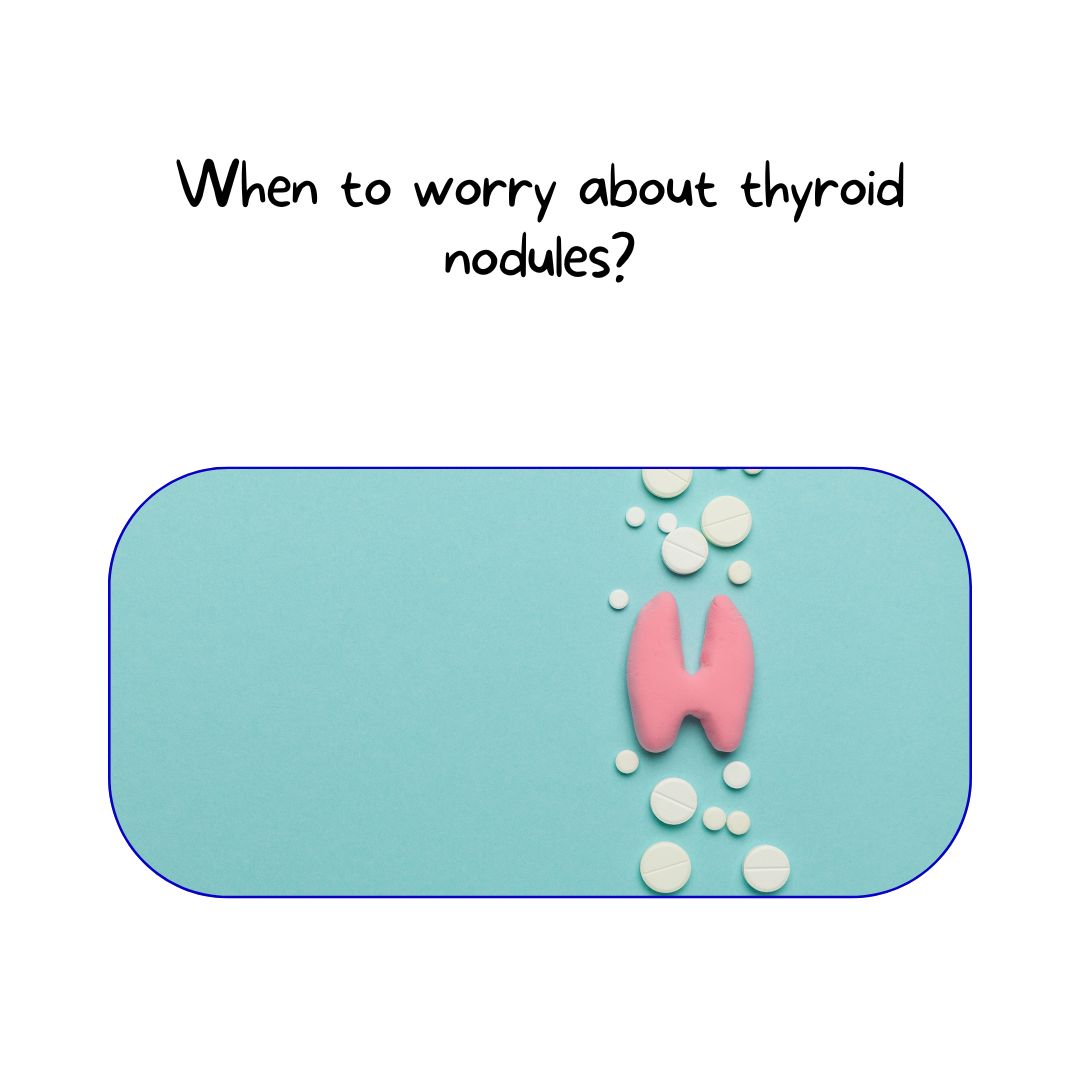When to worry about thyroid nodules?

When to worry about thyroid nodules? Thyroid nodules are small, solid, or fluid-filled lumps that form within the thyroid gland, which is located in the front of the neck. While most thyroid nodules are benign and do not cause any symptoms, they can sometimes grow or become cancerous, making them a cause for concern. In this article, we will explore the various aspects of thyroid nodules, including their prevalence, risk factors, symptoms, diagnosis, and treatment options.
What are thyroid nodules?
Thyroid nodules are growths that develop within the thyroid gland, which produces hormones that regulate various bodily functions, including metabolism. They can be either fluid-filled or solid and can vary in size from tiny to very large. In most cases, thyroid nodules are benign, but in some instances, they can be cancerous.
How common are thyroid nodules?
Thyroid nodules are quite common, particularly in older adults and women. In fact, studies have shown that up to 60% of people over the age of 60 have thyroid nodules. However, only a small percentage of these nodules are cancerous.
Why are thyroid nodules a concern?
Thyroid nodules are a concern because they can grow and cause various symptoms. In some cases, they can also be cancerous. It is important to be aware of the risk factors for thyroid nodules and to seek medical attention if you notice any changes in your neck or have any other concerning symptoms.
Risk factors for thyroid nodules
Age and gender: Thyroid nodules are more common in women and in people over the age of 60.
Family history of thyroid disease: If you have a family history of thyroid disease, you may be more likely to develop thyroid nodules.
Radiation exposure: Radiation exposure, particularly during childhood, has been linked to an increased risk of thyroid nodules.
Iodine deficiency: A lack of iodine in the diet can also increase the risk of thyroid nodules.
Types of thyroid nodules
There are three main types of thyroid nodules: benign, suspicious, and malignant.
Benign thyroid nodules: These nodules are non-cancerous and do not usually require treatment unless they are causing symptoms or growing.
Suspicious thyroid nodules: These nodules have characteristics that suggest they may be cancerous and require further testing.
Malignant thyroid nodules: These nodules are cancerous and require prompt treatment.
Symptoms of thyroid nodules
Most thyroid nodules do not cause any symptoms, but in some cases, they can cause the following:
Visible or palpable lumps on the neck: You may be able to feel a lump on your neck or notice a swelling.
Difficulty swallowing or breathing: Large nodules can press on the windpipe or esophagus, causing difficulty swallowing or breathing.
Voice changes: Nodules that press on the vocal cords can cause hoarseness or other voice changes.
Pain or discomfort in the neck: Some people may experience pain or discomfort in the neck, particularly when swallowing.
Diagnosis of thyroid nodules
If your healthcare provider suspects you may have thyroid nodules, they will likely perform a physical examination of your neck and may order imaging tests, such as an ultrasound or CT scan. If the nodules appear suspicious, they may recommend a fine needle aspiration biopsy to collect cells for further testing.
When to monitor thyroid nodules
In some cases, your healthcare provider may recommend monitoring thyroid nodules rather than immediately treating them. This may be the case if the nodules are small and not causing any symptoms, or if they are benign and not growing over time.
When to Treat Thyroid Nodules?
If a thyroid nodule is causing symptoms, is growing rapidly, or is suspicious of malignancy, treatment may be recommended.
Large nodules that cause symptoms such as difficulty swallowing or breathing may require surgery to remove the nodule and relieve the compression of nearby structures.
Rapidly growing nodules may require treatment with thyroid hormone suppression therapy or radioactive iodine therapy to slow down the growth of the nodule.
Suspicious nodules with a high risk of malignancy may require surgical removal or treatment with radioactive iodine therapy to remove the cancerous cells.
Treatment Options for Thyroid Nodules
Watchful waiting, or close monitoring of the nodule over time, is a common approach for nodules that do not require immediate treatment.
Thyroid hormone suppression therapy involves taking a medication that reduces the amount of thyroid-stimulating hormone (TSH) in the body, which can slow down the growth of the nodule.
Radioactive iodine therapy involves taking a radioactive form of iodine that is absorbed by the thyroid gland and destroys any thyroid cells, including cancerous ones.
Surgery may be necessary to remove a nodule that is causing symptoms, is rapidly growing, or is suspicious of malignancy.
Complications of Untreated Thyroid Nodules
If left untreated, thyroid nodules can cause complications such as compression of nearby structures, such as the windpipe or esophagus, which can cause difficulty breathing or swallowing.
Thyroid hormone imbalance can also occur if the nodule produces too much thyroid hormone, leading to symptoms such as weight loss, increased heart rate, and anxiety.
In some cases, thyroid nodules can be cancerous and can spread to other parts of the body if left untreated.
Prevention of Thyroid Nodules
Regular thyroid checkups with your healthcare provider can help detect thyroid nodules early and prevent complications.
Addressing risk factors, such as iodine deficiency or exposure to radiation, can also help prevent the development of thyroid nodules.
Conclusion
Thyroid nodules are a common condition that can be a cause for concern in some cases. By being aware of the risk factors, symptoms, and treatment options for thyroid nodules, you can ensure prompt diagnosis and management if necessary. With close monitoring and appropriate treatment, most thyroid nodules can be managed successfully, allowing you to maintain optimal thyroid health and overall well-being.